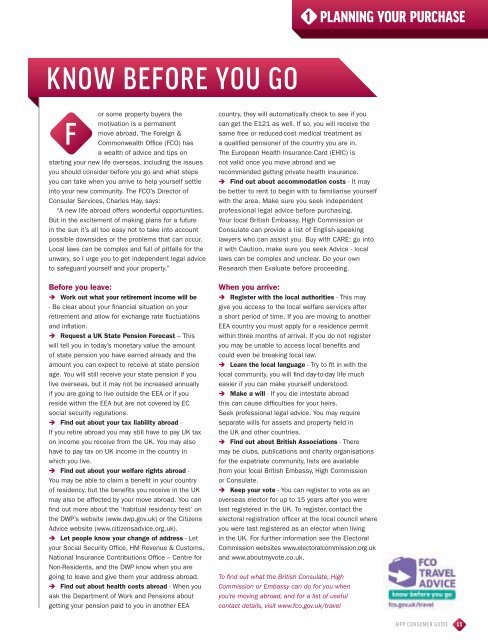HOW TO BUY - Target Markets- Global Property Investment
HOW TO BUY - Target Markets- Global Property Investment
HOW TO BUY - Target Markets- Global Property Investment
Create successful ePaper yourself
Turn your PDF publications into a flip-book with our unique Google optimized e-Paper software.
KNOW BEFORE YOU GO<br />
or some property buyers the<br />
motivation is a permanent<br />
move abroad. The Foreign &<br />
F Commonwealth Offi ce (FCO) has<br />
a wealth of advice and tips on<br />
starting your new life overseas, including the issues<br />
you should consider before you go and what steps<br />
you can take when you arrive to help yourself settle<br />
into your new community. The FCO’s Director of<br />
Consular Services, Charles Hay, says:<br />
“A new life abroad offers wonderful opportunities.<br />
But in the excitement of making plans for a future<br />
in the sun it’s all too easy not to take into account<br />
possible downsides or the problems that can occur.<br />
Local laws can be complex and full of pitfalls for the<br />
unwary, so I urge you to get independent legal advice<br />
to safeguard yourself and your property.”<br />
Before you leave:<br />
Ë Work out what your retirement income will be<br />
- Be clear about your fi nancial situation on your<br />
retirement and allow for exchange rate fl uctuations<br />
and infl ation.<br />
Ë Request a UK State Pension Forecast – This<br />
will tell you in today’s monetary value the amount<br />
of state pension you have earned already and the<br />
amount you can expect to receive at state pension<br />
age. You will still receive your state pension if you<br />
live overseas, but it may not be increased annually<br />
if you are going to live outside the EEA or if you<br />
reside within the EEA but are not covered by EC<br />
social security regulations.<br />
Ë Find out about your tax liability abroad -<br />
If you retire abroad you may still have to pay UK tax<br />
on income you receive from the UK. You may also<br />
have to pay tax on UK income in the country in<br />
which you live.<br />
Ë Find out about your welfare rights abroad -<br />
You may be able to claim a benefi t in your country<br />
of residency, but the benefi ts you receive in the UK<br />
may also be affected by your move abroad. You can<br />
fi nd out more about the ‘habitual residency test’ on<br />
the DWP’s website (www.dwp.gov.uk) or the Citizens<br />
Advice website (www.citizensadvice.org.uk).<br />
Ë Let people know your change of address - Let<br />
your Social Security Offi ce, HM Revenue & Customs,<br />
National Insurance Contributions Offi ce – Centre for<br />
Non-Residents, and the DWP know when you are<br />
going to leave and give them your address abroad.<br />
Ë Find out about health costs abroad - When you<br />
ask the Department of Work and Pensions about<br />
getting your pension paid to you in another EEA<br />
country, they will automatically check to see if you<br />
can get the E121 as well. If so, you will receive the<br />
same free or reduced-cost medical treatment as<br />
a qualifi ed pensioner of the country you are in.<br />
The European Health Insurance Card (EHIC) is<br />
not valid once you move abroad and we<br />
recommended getting private health insurance.<br />
Ë Find out about accommodation costs - It may<br />
be better to rent to begin with to familiarise yourself<br />
with the area. Make sure you seek independent<br />
professional legal advice before purchasing.<br />
Your local British Embassy, High Commission or<br />
Consulate can provide a list of English-speaking<br />
lawyers who can assist you. Buy with CARE: go into<br />
it with Caution, make sure you seek Advice - local<br />
laws can be complex and unclear. Do your own<br />
Research then Evaluate before proceeding.<br />
When you arrive:<br />
Ë Register with the local authorities - This may<br />
give you access to the local welfare services after<br />
a short period of time. If you are moving to another<br />
EEA country you must apply for a residence permit<br />
within three months of arrival. If you do not register<br />
you may be unable to access local benefi ts and<br />
could even be breaking local law.<br />
Ë Learn the local language - Try to fi t in with the<br />
local community, you will fi nd day-to-day life much<br />
easier if you can make yourself understood.<br />
Ë Make a will - If you die intestate abroad<br />
this can cause diffi culties for your heirs.<br />
Seek professional legal advice. You may require<br />
separate wills for assets and property held in<br />
the UK and other countries.<br />
Ë Find out about British Associations - There<br />
may be clubs, publications and charity organisations<br />
for the expatriate community, lists are available<br />
from your local British Embassy, High Commission<br />
or Consulate.<br />
Ë Keep your vote - You can register to vote as an<br />
overseas elector for up to 15 years after you were<br />
last registered in the UK. To register, contact the<br />
electoral registration offi cer at the local council where<br />
you were last registered as an elector when living<br />
in the UK. For further information see the Electoral<br />
Commission websites www.electoralcommission.org.uk<br />
and www.aboutmyvote.co.uk.<br />
To fi nd out what the British Consulate, High<br />
Commission or Embassy can do for you when<br />
you’re moving abroad, and for a list of useful<br />
contact details, visit www.fco.gov.uk/travel<br />
1 PLANNING YOUR PURCHASE<br />
AIPP CONSUMER GUIDE 11


